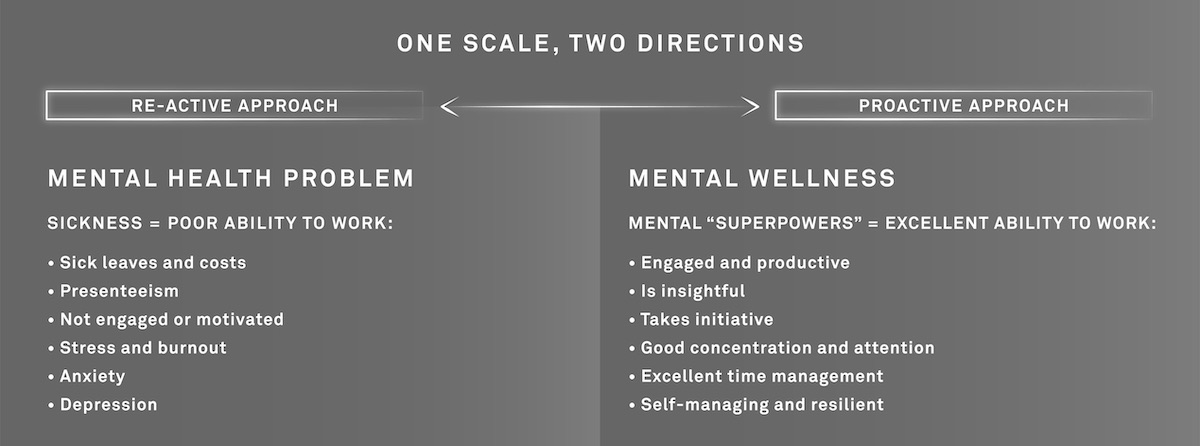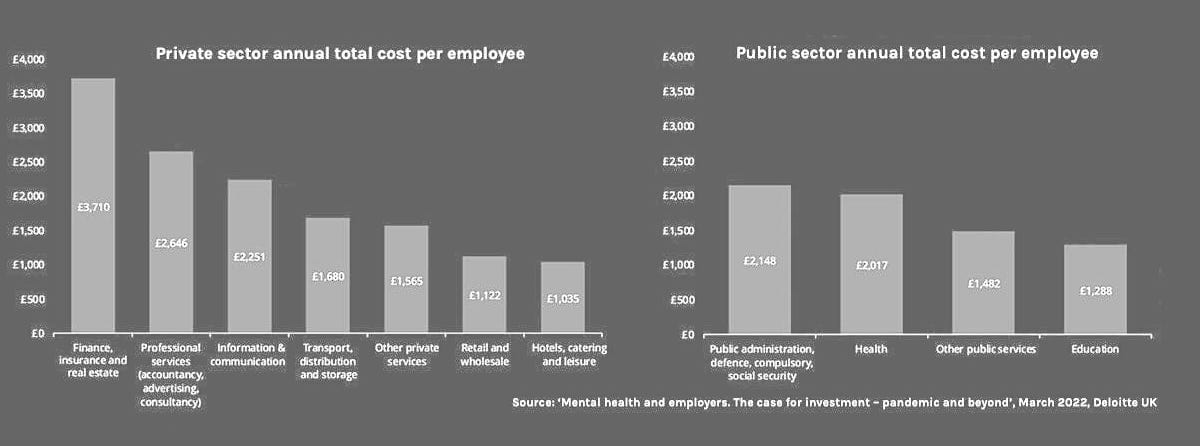Come and uncover the essence of mental wellness and discover how it is multi-dimensional, holistic, personal and influences work.
Welcome to our short and comprehensive guide on mental wellness.
In this article, we will explore what mental wellness is, and how it differs from mental illness or mental health problems. We will discuss the importance of mental wellness, the strategies and practices that promote it at work, and how mental wellness can contribute to a richer and more meaningful work experience and secure life-work integration.
It's time for employers to shift from a reactive approach to addressing mental health issues and start engaging in proactive conversations about the "What" and "How" of mental health in relation to mental wellness.
It's widely acknowledged that, at the organizational level, an organization's culture holds more significance than any strategy.
When it comes to change, internal factors consistently have more influence than external ones. This principle holds true not only within the organization but also within each individual.
On a personal level, maintaining mental well-being and upholding strong ethics serve as the foundation for our actions and behaviors.
What is Mental Wellness?
Mental wellness refers to the excellent state of our mental and emotional health.
Mental wellness encompasses more than just the absence of mental illness and recognizes that is the quality of life that matters.
Mental wellness is a continuum that ranges from illnesses and languishing (see the left-hand side of the graph below) to flourishing (see the right-hand side of the graph below).

On the left side, you find the current reactive mental health approach. On the right side, you discover the benefits of the new proactive mental wellness approach.
It is estimated that about 70% to 80% of the population doesn't have a diagnosed mental illness. However, most of these people aren't all mentally well or thriving due to pervasive stress, worry, loneliness, and other negative inner reactions that pop up.
Key Things to Know About Mental Wellness
- Mental wellness is more than just the absence of mental illness.
- Mental wellness is an active process of moving from languishing to resilience to flourishing.
- Mental wellness helps to shift the perspective away from stigma to shared humanity.
- Mental wellness grows out of a grassroots, it is shifted away from consumerism and sees being well as a holistically driven movement.
- Mental wellness is multi-dimensional and always personal.
Moving towards multi-dimensional mental wellness is an active process that involves proactivity in all areas. It focuses on securing intrapersonal education. For example, in case of stress and anxiousness, it focuses on early prevention strategies that people learn while they are well.
The best mental wellness practices allow for coping with life's adversity.
The proactive mental wellness approach allows being resilient and thus facing stress or dealing with worry, loneliness, anger and sadness or mental health issues become easier.
Mental wellness helps shift our focus towards a positive and empowering approach, emphasizing our capacity to build resilience, reduce suffering, find inner peace and joy, and seek meaning, purpose, and connection.
Promoting Mental Wellness
Evidence shows that improving our mental wellness can reduce our risk of developing mental illness. However, not enough attention is paid globally to mental illness prevention and mental wellness promotion.
Consumers, practitioners, and business leaders have led the charge in seeking self-directed, alternative solutions outside of the established fields of medicine, psychiatry, and psychology. Often this forgets the best of modern psychology and therapy practices. While people are looking at self-help books and centuries-old natural and holistic mental wellness modalities we also need to push science and online learning into areas where it has not gone before.
Systematic proactive mental wellness is here the new emerging solution that we stand for. It has a strong scientific background and combines modern studies about the benefits of awareness, mindfulness and consciousness. This new mental wellness approach is a step away from the subconscious habitual autopilot mode and towards more human-centric intrapersonal skills focused practices that everyone can benefit from.
We see mental wellness as multi-dimensional, holistic, and personal.
The mental wellness revolution promotes an integrated and holistic nature of our health and wellbeing, where the state of our mind affects our body and vice versa.
It sets a new systematic path to securing mental wellness. Here employees and business owners can choose the strategies and activities that are most important or effective for them. These include learning and applying awareness-based intrapersonal skills. Such self-leadership skills open up creativity and inner growth opportunities and give us improved access to using something that makes us human – our awareness.
A person who is mentally well values health, nourishment, rest, rejuvenation and healthy human connections. Securing good mental wellness and inner calmness and brings along discovering the deeper meaning of life and work.
How is mental wellness connected with work?
Mental wellness is closely connected to work results, as it affects employee performance, engagement, and productivity. According to a study by the World Health Organization, depression and anxiety disorders cost the global economy $1 trillion each year in lost productivity.
Employees with high levels of mental wellness are more engaged, satisfied with their jobs, and productive. Over the last years, the average global employee engagement level is just around 23%, there is a lot of room for improvement.
By addressing mental wellness in the workplace, companies can create a positive work environment, reduce absenteeism and turnover, and ultimately, improve their bottom line.
Investing in mental wellness in the workplace has become a growing trend as it has a tenfold ROI.
However, the Deloitte UK report ‘Mental health and employers. The case for investment – pandemic and beyond', from March 2022, pointed out that the annual unacknowledged mental health cost per employee these days varies between £1035 ($1345 or 1150€) and £3,710 ($4820 or 4,120€). So, this points out that the current path needs urgent change and such losses can be avoided.

The wise choice here is to start training your brightest minds and see tenfold ROI from systematic mental wellness training or loss.
|
Conclusion
In conclusion, mental wellness is a crucial aspect of our overall health and wellbeing.
Mental wellness involves more than just the absence of mental illness and recognizes the complex relationship between our private lives and work relations.
Moving towards mental wellness is an active process that involves prevention, coping with life's adversity, and being resilient when facing stress and dealing with burnout in the early stages.
Securing mental wellness proactively is the path to reducing worry, loneliness, anger, and sadness. Possessing a fit mind well secures overall wellbeing, and also, in the work context, improves employee engagement and productivity.
Mental wellness grows out of the grassroots and is personal. However, when persons with good mental wellness meet and partner up, workplaces thrive.
The strategies and intrapersonal skills centric practices can help promote mental wellness, leading to a richer and more meaningful human experience.





